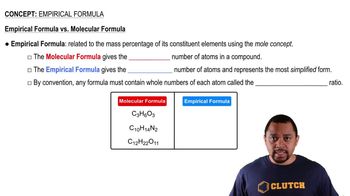Classify each of the following as a pure substance, a solution, or a heterogeneous mixture: (b) a 999 gold bar
(b) A(n) _________ reliably predicts the behavior of matter, while a(n) _________ provides an explanation for that behavior.

Verified Solution
Key Concepts
Scientific Law

Scientific Theory

Empirical Evidence

Classify each of the following as a pure substance, a solution, or a heterogeneous mixture: (c) stainless steel.
(a) Which is more likely to eventually be shown to be incorrect: an hypothesis or a theory?
A sample of ascorbic acid (vitamin C) is synthesized in the laboratory. It contains 1.50 g of carbon and 2.00 g of oxygen. Another sample of ascorbic acid isolated from citrus fruits contains 6.35 g of carbon. According to the law of constant composition, how many grams of oxygen does it contain?
Two students determine the percentage of lead in a sample as a laboratory exercise. The true percentage is 22.52%. The students' results for three determinations are as follows: (1) 22.52, 22.48, 22.54 (2) 22.64, 22.58, 22.62 (b) Precision can be judged by examining the average of the deviations from the average value for that data set. (Calculate the average value for each data set; then calculate the average value of the absolute deviations of each measurement from the average.) Which set is more precise?
